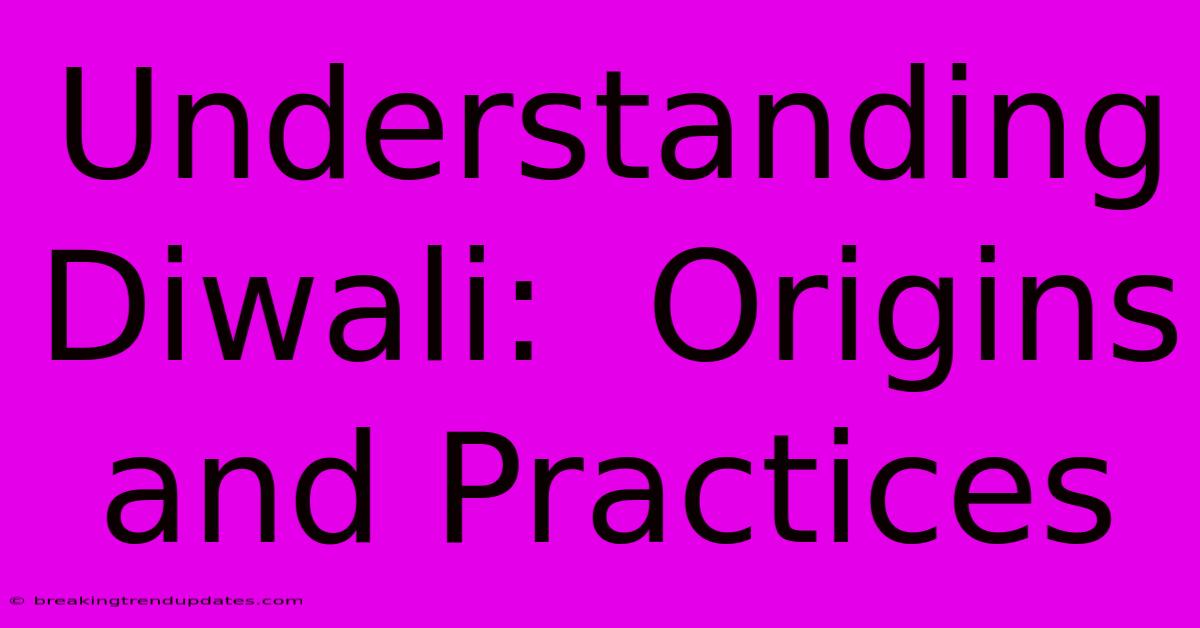Understanding Diwali: Origins And Practices

Discover more detailed and exciting information on our website. Click the link below to start your adventure: Visit Best Website breakingtrendupdates.com. Don't miss out!
Table of Contents
Understanding Diwali: Origins and Practices
Diwali, the Festival of Lights, is a vibrant and joyous celebration observed by millions across the world, especially in India, Nepal, and other parts of South Asia. But beyond the dazzling lights and colorful fireworks, lies a rich history and cultural significance that makes Diwali more than just a festival – it's a celebration of hope, prosperity, and the triumph of good over evil.
Origins and Mythology:
Diwali's origins can be traced back to ancient India, with multiple stories and myths intertwined within its celebration.
The most popular legend recounts the return of Lord Rama, the seventh avatar of Vishnu, to Ayodhya after 14 years of exile. After defeating the demon king Ravana, Rama's victory symbolized the triumph of dharma (righteousness) over adharma (evil). The people of Ayodhya lit diyas (oil lamps) to welcome their king back home, illuminating the path and dispelling the darkness.
Another story centers around the goddess Lakshmi, the deity of wealth and prosperity. Diwali is believed to be the day she emerged from the churning of the cosmic ocean, bringing blessings of wealth and prosperity. People decorate their homes and businesses with lights and diyas to invite Lakshmi and her blessings.
Diwali Practices and Rituals:
Diwali is a five-day festival, with each day carrying specific significance.
- Dhanteras: The first day marks the beginning of Diwali. It is dedicated to worshipping Goddess Lakshmi and Lord Kubera, the god of wealth. People purchase new utensils, jewelry, and other items considered auspicious.
- Choti Diwali: This day is about cleaning homes, lighting diyas, and preparing for the grand celebrations ahead.
- Lakshmi Puja: This is the main day of Diwali. People decorate their homes with diyas, candles, and rangoli (colorful patterns) to welcome Lakshmi. They perform Lakshmi puja, offering prayers and sweets to the goddess.
- Govardhan Puja: This day is dedicated to Lord Krishna, commemorating his victory over Indra, the king of gods.
- Bhai Dooj: The final day is celebrated for the special bond between siblings. Sisters apply tilak to their brothers' foreheads, praying for their well-being.
Significance and Symbolism:
Diwali holds immense cultural and spiritual significance, symbolizing several important values:
- Triumph of Good over Evil: The defeat of Ravana by Rama symbolizes the victory of good over evil, light over darkness, and knowledge over ignorance.
- Prosperity and Wealth: The worship of Lakshmi signifies the desire for prosperity, wealth, and abundance.
- New Beginnings: Diwali marks the beginning of a new year, symbolizing a time for renewal, hope, and optimism.
- Family and Unity: The festival brings families together, fostering a sense of unity and togetherness.
Conclusion:
Diwali is more than just a festival of lights; it's a deep-rooted celebration of cultural values, religious beliefs, and historical events. The vibrant colors, dazzling lights, and joyous atmosphere create a truly unforgettable experience, making Diwali one of the most cherished festivals in India and around the world.

Thank you for visiting our website wich cover about Understanding Diwali: Origins And Practices. We hope the information provided has been useful to you. Feel free to contact us if you have any questions or need further assistance. See you next time and dont miss to bookmark.
Thank you for visiting our website wich cover about Understanding Diwali: Origins And Practices. We hope the information provided has been useful to you. Feel free to contact us if you have any questions or need further assistance. See you next time and dont miss to bookmark.
Featured Posts
-
Sarado Ba Ang Bangko Ngayon
Nov 01, 2024
-
Muere Abuelo De Franco Colapinto En Bahia Blanca
Nov 01, 2024
-
Vic 0 2 Atletico De Madrid Resultado Final
Nov 01, 2024
-
Cwru Me Too Support Halloween Gathering
Nov 01, 2024
-
Diwali 2024 Date And Why Its A Major Festival
Nov 01, 2024
